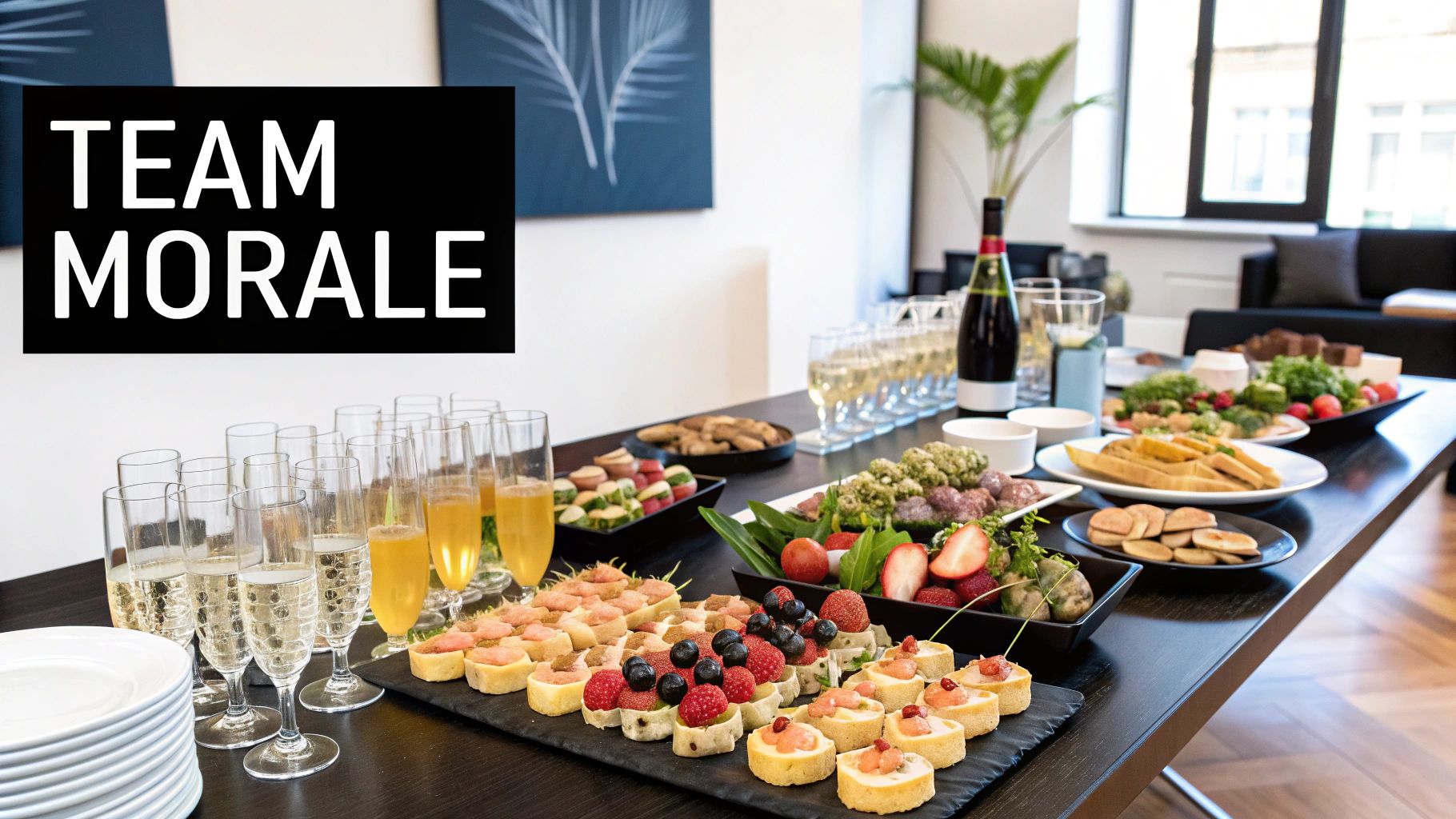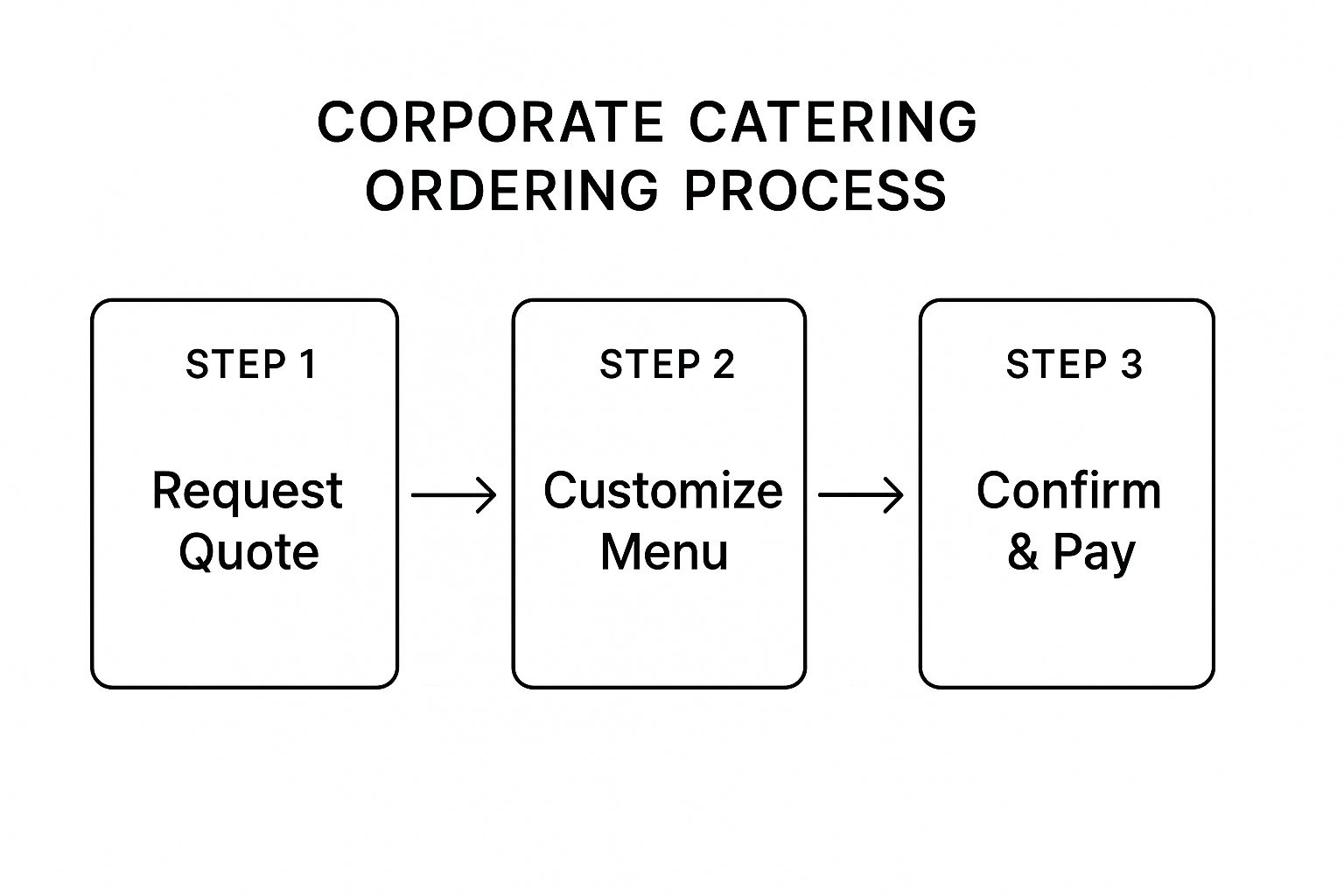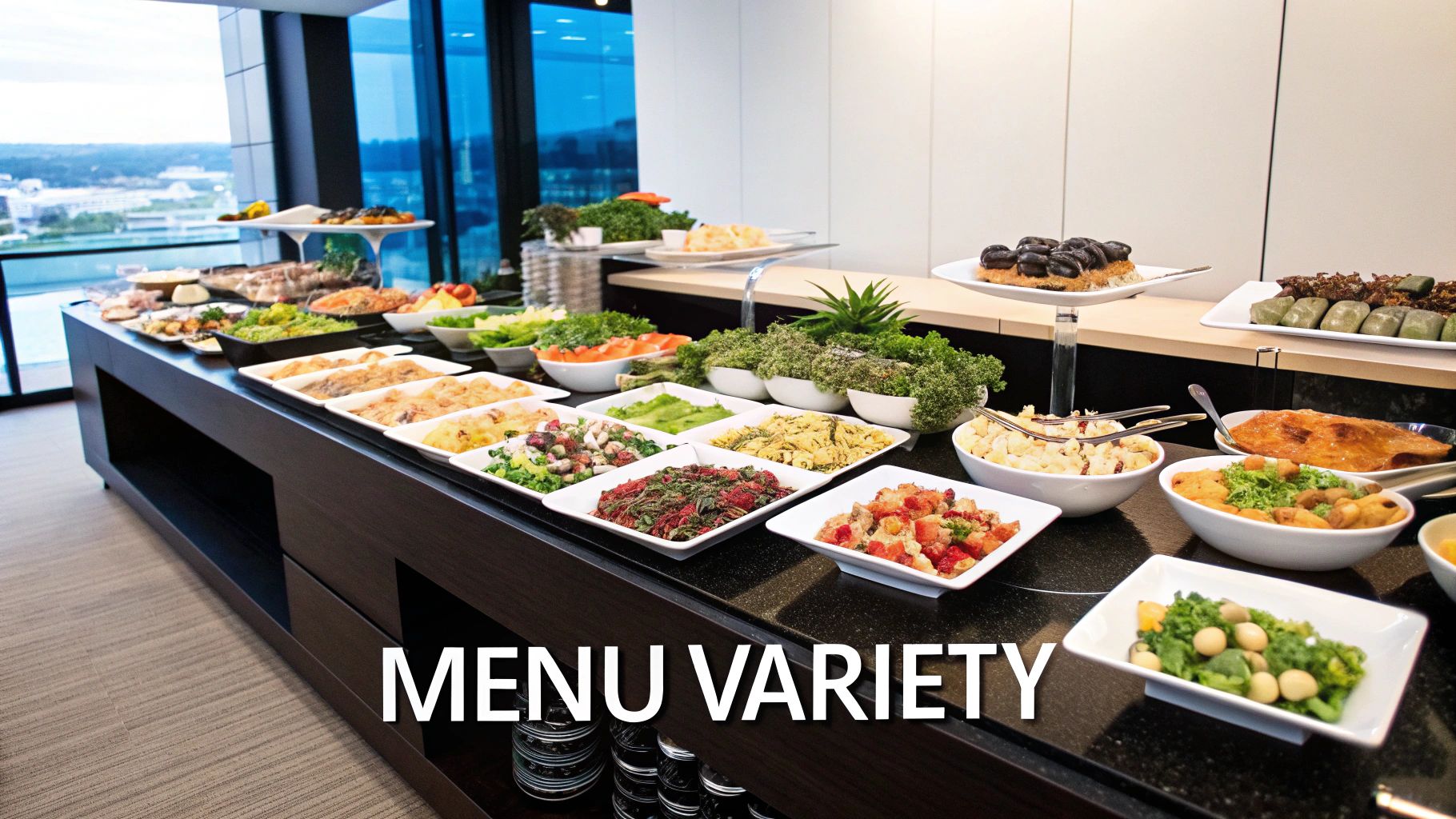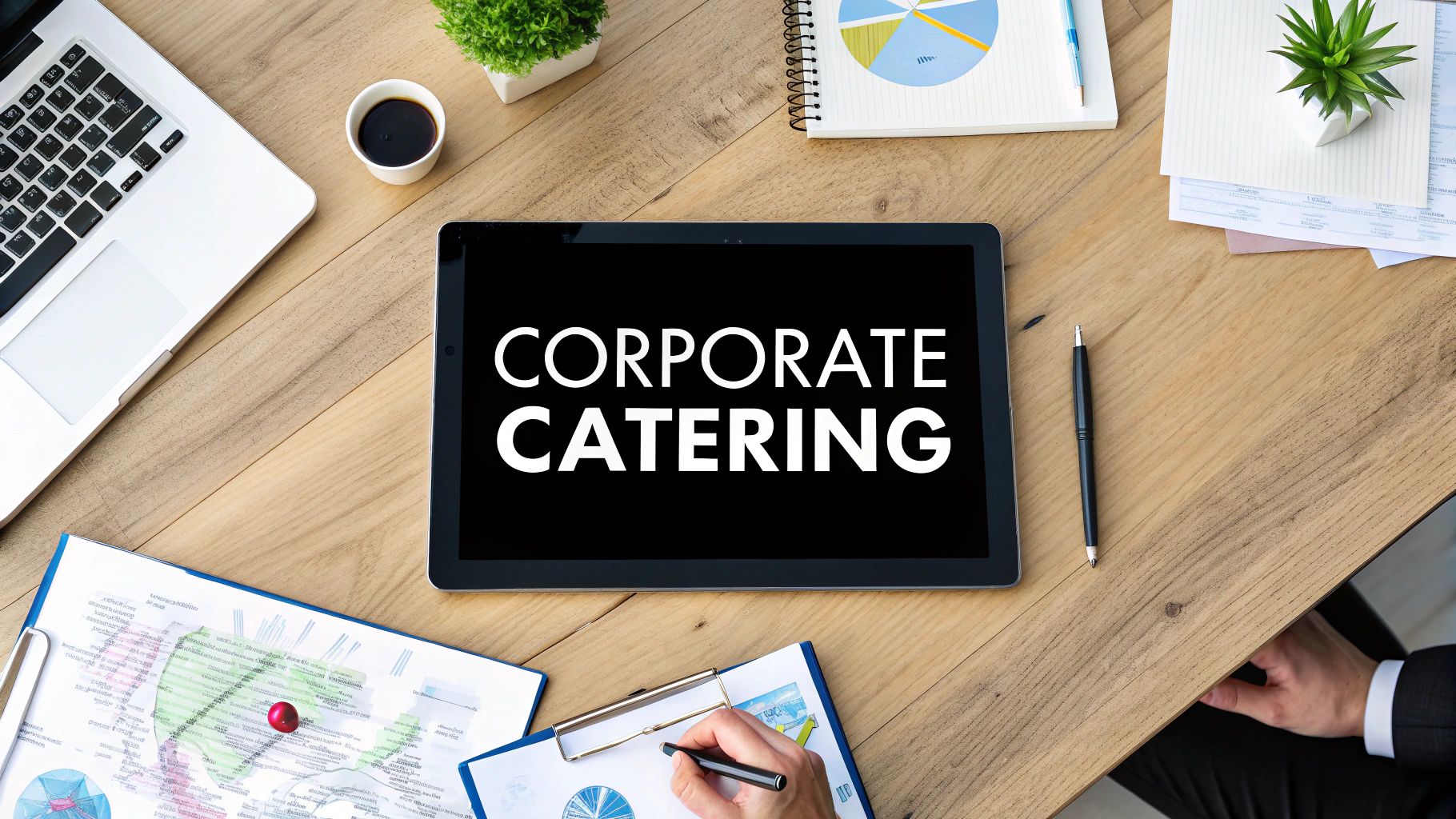Before you even start Googling “corporate catering near me,” the most important thing you can do is take a moment to figure out exactly what you need. A little bit of planning right now saves a ton of headaches later and guarantees you get quotes that actually make sense for your event.
Nailing down your headcount, budget, and dietary needs first turns a wild goose chase into a focused, efficient search.
Figuring Out Your Corporate Catering Needs
Great corporate events don't just happen; they're built on a foundation of clear, upfront planning. Searching for a caterer without a solid plan is like trying to build furniture without the instructions—you'll get something done, but it probably won’t be what you wanted. Just carving out 30 minutes to outline the specifics will make the entire process so much smoother.
This is about more than just food. You're crafting an experience that reflects your company’s goals, whether you’re trying to impress a major client, reward your team for a job well done, or just fuel a productive all-day workshop.
Pinpoint Your Headcount and Budget
First things first, get a realistic headcount. A weekly team lunch for 15 people is a completely different ballgame than a quarterly all-hands meeting for 200. You'll want to confirm the final number a few days out, but start with a solid estimate.
Next, you need to set a budget. Knowing your per-person spend is the fastest way to narrow down your options. A budget of $20-$25 per person is often perfect for something like boxed lunches, whereas a formal client dinner might land closer to $75 per person or even more.
Always ask potential caterers about any extra fees. Things like delivery, setup, and service charges can sneak up on you, so get them on the table early to keep your budget on track.
Expert Tip: I always recommend adding a small buffer to your headcount—about 5-10%. This covers any last-minute guests or surprisingly hungry team members. Trust me, it's far better to have a little extra food than to run out.
Identify Dietary Needs and Set the Tone
In any modern workplace, catering to dietary restrictions isn't just a nice-to-have, it's essential. Before you even think about contacting caterers, get a clear picture of your team's needs. This isn't just about what people like to eat; it's about keeping everyone safe and included.
- Common Allergies: Be vigilant about serious allergies like peanuts, tree nuts, dairy, and shellfish. These require a caterer who understands cross-contamination.
- Dietary Choices: Vegan, vegetarian, and halal options are pretty standard these days, so make sure your caterer can provide them.
- Health Restrictions: Don't forget about requests for gluten-free or low-sugar meals to accommodate specific health needs.
The vibe of your event also plays a huge role in your catering choice. A casual Friday lunch is perfect for buffet-style platters that let people mingle and serve themselves. For a more structured environment, like providing meals for a busy production team, you’ll find great advice on catering for warehouse staff that prioritizes speed and satisfaction.
On the other hand, a formal dinner to woo potential investors demands a completely different approach, likely with plated service and a more sophisticated menu. Getting clear on these details from the start ensures your search for "corporate catering near me" leads you to a partner who perfectly matches your event's goals.
How to Effectively Find Local Caterers

Alright, you've got your event plan locked in. Now for the fun part: finding a caterer who can bring your vision to life. A quick search for "corporate catering near me" is going to throw a lot of names at you. The real skill is cutting through the noise to find the gems.
Think of it as casting a wide net first, then slowly pulling it in until you have a handful of top-notch contenders.
Your first stop should be online review sites like Google Maps and Yelp. But don't just glance at the star rating. Dig into the comments, especially those from the last six to twelve months, and look for reviews mentioning corporate or office events specifically.
A caterer might have fantastic reviews for weddings, but if their corporate lunch feedback is lukewarm, they might not be the right fit. You’re looking for consistent praise about punctuality, professional service, and, of course, delicious food.
Leveraging Your Professional Network
Sometimes, the best intel comes from the people you already know. Tapping into your professional network is one of the smartest ways to find a caterer you can count on.
Here are a few simple ways to do it:
- Ask Your Neighbours: Shoot a quick email to the office manager in the business next door. A simple, "Who do you use for catering? Were they any good?" can save you hours of research.
- Check Local Business Groups: Post a query on a local business association forum or a relevant LinkedIn group. You'll often get honest, unfiltered feedback from people in your own shoes.
- Talk to Your Venue: If you're hosting an event off-site, the venue coordinator is your best friend. They have a list of preferred caterers they trust to get the job done right.
A personal recommendation gives you insights you just can't find online, like how a caterer handled an unexpected dietary request or a last-minute change. It's also helpful to look at menus from established professionals—for example, a company with years of experience in catering in Toronto can give you a great benchmark for what to expect.
A referral is gold. It comes pre-vetted by someone whose judgment you already trust, which is a massive head start in the vetting process.
Building Your Shortlist of Caterers
Your next goal is to narrow that big list down to three to five strong candidates. Any more than that, and you'll get bogged down in quotes and details. This number is the sweet spot—enough options to compare, but not so many that you get decision fatigue.
Office catering is booming as more teams return to a shared workspace. In 2022, the U.S. catering market was valued at a massive USD 60.4 billion, and the corporate segment is a huge piece of that pie. You can find more details about this growth from Grand View Research.
With more options than ever, being selective is key.
Once you have your shortlist, you're ready to start making calls and getting quotes. This focused approach means you're only investing your time in caterers who have already proven they can deliver for events just like yours.
Vetting and Comparing Your Shortlisted Caterers
You've done the initial legwork and moved beyond the generic "corporate catering near me" search. Now you have a shortlist of potential partners, and it's time to get down to the nitty-gritty. This is where you separate the good from the great.
Think of this stage less like shopping and more like conducting an interview. You’re not just buying food; you're entrusting a critical piece of your event's success to an outside team. Their performance, from the food quality to their professionalism, is a direct reflection on your company.
Kicking Off the Conversation
That first email or phone call is your prime opportunity to gather the details that matter. Don't hold back—a seasoned corporate caterer has heard it all before and should have ready, confident answers to your specific questions.
Here’s what I always ask to get a real feel for their capabilities:
- Proven Corporate Experience: "Could you walk me through a few recent corporate events you've handled for a group of 50 people? What did you provide for them?" This pushes past a simple "yes" and gets you real-world examples.
- Logistical Know-How: "What's your standard procedure for delivering to a high-security downtown office building? Do your services include all the necessary serving gear, plates, and cutlery, or is that extra?"
- Handling Dietary Needs: "How do you guarantee there's no cross-contamination for serious allergies like celiac disease or nut allergies? What does your labelling system look like?"
Their response tells you a lot. A caterer who is organized, transparent, and quick to reply is likely to bring that same level of reliability on the day of your event.
How to Actually Read a Catering Quote
When the proposals land in your inbox, resist the urge to immediately scroll to the bottom line. The cheapest option is rarely the best value. A low price can hide smaller portion sizes, surprise fees, or a lack of essential services.
A professional quote should be completely transparent, breaking down every single cost.
A vague, all-in-one number is a major red flag. You should be looking for a detailed, itemized list: cost per person, delivery fees, service charges, and any separate costs for staff or equipment. If it’s not there, ask for it.
This level of detail is what lets you compare apples to apples. You might discover that a quote that seems 10% higher actually includes setup, breakdown, and premium disposable plates, which ultimately saves you a ton of time and hassle.
This simple graphic lays out the typical journey from that first quote to the final, delicious delivery.

As you can see, getting the quote is just the beginning. The real magic happens in the customization and confirmation stages that follow.
The Taste Test: Your Most Important Decider
For any significant event, a tasting isn't a luxury—it's essential. You wouldn't buy a fleet of company cars without a test drive, right? This is your one chance to experience the food quality, flavour profiles, and presentation before you sign on the dotted line.
Try to arrange a tasting of two or three key dishes from your proposed menu. As you taste, think beyond just flavour. How is the food presented? Ask them how it will be transported and kept warm or cold. That beautiful seared tuna might be incredible fresh from the pan, but how does it hold up after an hour in a buffet chafer? This is also the perfect time to sample their gluten-free or vegan options to make sure everyone on your team gets a meal that feels special, not like an afterthought.
To keep your evaluations organized and objective, use a simple checklist. This helps you compare each caterer on the same criteria, making the final decision much clearer.
Caterer Comparison Checklist
Use this checklist to systematically compare your shortlisted corporate caterers.
| Evaluation Criteria | Caterer A | Caterer B | Caterer C |
|---|---|---|---|
| Responsiveness & Professionalism | |||
| Relevant Corporate Experience | |||
| Quote Transparency (Itemized) | |||
| Menu Variety & Customization | |||
| Dietary Accommodation Process | |||
| Tasting Quality & Presentation | |||
| Logistics & Delivery Plan | |||
| Overall Value (Cost vs. Service) | |||
| Client Reviews & References | |||
| Total Estimated Cost |
Once you've filled this out, the right choice often becomes obvious. It's the partner who not only scores high on food quality but also gives you confidence in their ability to execute flawlessly.
Choosing the Right Menu and Service Style

Okay, you’ve narrowed down your list of potential caterers. Now comes the fun part—the food. But picking the right menu and service style is about more than just what tastes good. It’s really about matching the food experience to the vibe and purpose of your event.
A casual team-building lunch just doesn't call for the same setup as a formal dinner to impress a new client. The trick is to choose a format that helps you hit your event's goals, whether that’s getting people to chat, keeping a meeting on schedule, or wowing your guests.
Selecting the Ideal Service Format
How the food is served has a huge impact on the atmosphere. Each style brings something different to the table, and knowing the pros and cons is key to getting it right for your space and schedule.
-
Buffet-Style: Buffets are a classic for good reason. They get people up, moving, and talking, which is perfect for relaxed lunches or any event where you want guests to mingle. A smart setup, like the ones we break down in our guide to buffet-style office catering, can handle a large crowd without a hitch.
-
Individually Packaged Meals: When you've got a working lunch, a tight training schedule, or just need to keep things moving, boxed meals are your best friend. They're the ultimate grab-and-go option, cutting down on disruption and making cleanup a breeze. Plus, they make it incredibly easy to manage specific dietary requests accurately.
-
Family-Style Platters: This is a fantastic middle-ground. Large platters are brought to each table, and everyone helps themselves. It creates a warm, communal feeling that’s ideal for team dinners or smaller celebrations where you want to build camaraderie.
Crafting a Menu for Diverse Palates
The secret to a winning corporate menu? Variety and inclusivity. You’re feeding a whole group of individuals, each with their own tastes and dietary needs, so a thoughtful, balanced menu is non-negotiable.
It's always a safe bet to start with a crowd-pleaser like grilled chicken or a popular beef dish. But don't just stop there. You absolutely need a vegetarian or vegan main that’s more than an afterthought. Think quinoa-stuffed peppers or a hearty lentil curry—something that shows your non-meat-eating colleagues they were just as important in the planning.
Pro Tip: I always stick to the "one-third" rule when planning a menu. Aim for about one-third of your main dishes and sides to be vegetarian or vegan. It’s a simple guideline that ensures everyone has plenty of choice and often covers other needs, like dairy-free or halal, without even trying.
Embracing Modern Catering Trends
Corporate catering isn't what it used to be. Today, there’s a massive focus on wellness and sustainability. Caterers, especially in corporate-heavy regions, are stepping up with eco-friendly practices. We’re talking compostable packaging, locally sourced ingredients, and zero-waste policies to meet both regulations and what clients are now demanding.
Partnering with a caterer who gets this can say a lot about your own company. It shows your team and your clients that you’re a forward-thinking organization that cares about wellness and social responsibility. When you're down to your final two or three options, asking about their sustainability practices can be the perfect way to make that final call.
Finalizing Logistics for a Flawless Event
Alright, you've sifted through the "corporate catering near me" results, done the taste tests, and you're ready to commit. This is the home stretch, and it’s all about locking down the details to make sure everything runs like clockwork. Getting the logistics right is what turns a good meal into an event people remember for all the right reasons.
Think of this part as your pre-flight checklist. A little diligence now saves you from day-of scrambles and last-minute panic. When you methodically confirm every detail, you give yourself permission to actually relax and focus on your guests when the time comes.
Confirming the Key Details
Before you put pen to paper, it's time for one last pass on the core details. Your caterer is juggling multiple events and so are you; a quick final check-in prevents simple mix-ups from turning into big problems. This is about making sure everyone is on the exact same page.
Run through these essentials one more time:
- Final Headcount: Give them the final number. It’s also smart to ask about their policy for any last-minute additions or drop-offs—it happens.
- Dietary Review: Send over the final, detailed list of every dietary restriction and allergy. Make sure you confirm their plan for keeping these meals separate and clearly labelled. You don't want any guesswork here.
- Timeline Lock-in: Get specific with the times. Agree on exact windows for delivery, setup, when the food will be served, and cleanup. "Delivery between 11:45 AM and 12:00 PM" is a lot better than a vague "around noon."
These confirmations are more important than ever. In 2024, California's catering industry is navigating some serious food and labour cost increases, which can sometimes impact availability. Reconfirming everything helps ensure your event is securely on their calendar. You can read more about the challenges facing California's restaurant industry at RestaurantRealty.com.
Scrutinizing the Final Contract
The contract is your safety net, so treat it that way. Read it from top to bottom before signing, and don't be afraid to zoom in on the fine print. A solid, clear agreement protects both you and the caterer by setting crystal-clear expectations.
Zero in on these key areas:
- Payment Schedule: Know exactly what the deposit is, when the final payment is due, and what forms of payment they take.
- Cancellation Policy: Life happens. What’s the process if you have to cancel or push the date back? Understand the deadlines for getting a partial or full refund to avoid any nasty surprises.
- Included Services: The contract should spell out everything. Is it just the food, or does it include staff, serving dishes, linens, and cleanup? If it isn't written down, you can't assume it's included.
A pro will always provide a detailed contract without you having to chase them for it. If the agreement seems a little too simple or vague, that’s a big red flag. Never hesitate to ask for more detail before you commit.
Establishing a Clear Point of Contact
On the day of the event, confusion is your enemy. The easiest way to avoid it is by having a single, designated point person at your office and confirming who your direct contact is at the catering company. This simple step creates a direct line for communication.
Your point person will be the one to greet the catering team, show them where to set up, and handle any questions that pop up. Give the caterer their name and mobile number ahead of time. That way, if a small issue arises, they know exactly who to call, and your event can continue without a hitch.
Your Corporate Catering Questions, Answered

Even after you think you've got everything sorted with your caterer, a few last-minute questions always seem to pop up. It's totally normal. Here are some straightforward answers to the queries we hear most often from businesses planning their events. Think of this as your cheat sheet for managing the process smoothly, from that first call to the final bite.
How Far in Advance Should I Book Catering?
Timing really is everything, and how much notice you need to give depends entirely on the size and style of your event.
For a small, recurring team lunch for 15-20 people, you can often get away with booking just 48-72 hours ahead. That said, giving a week's notice is always a better bet to ensure you get what you want.
But when the guest list grows, so does the planning window. If you're organizing a company-wide meeting for 100 people or a holiday party, you'll want to lock in your caterer at least 3-4 weeks in advance. For the big stuff—think major events with over 200 guests or menus that need a lot of customization—it’s smart to start the conversation 2-3 months out.
Booking early isn’t just about securing a spot; it’s about getting the best service. An experienced caterer will use that extra time to fine-tune your menu, coordinate logistics, and ensure every detail is perfect, taking the pressure off your plate.
What Is a Typical Cost Per Person for Office Catering?
Trying to nail down a budget for corporate catering can feel like a guessing game, but most services fall within a few predictable price ranges. The final cost per person is really a reflection of menu complexity, service style, and any extras you add on.
Here’s a general breakdown to help you get started when you’re looking up "corporate catering near me":
- Simple Drop-Off Lunch: For grab-and-go options like sandwich platters or individually boxed meals, you should budget somewhere between $20 to $30 per person.
- Hot Buffet-Style Meal: A more substantial hot buffet, complete with a main protein, sides, and a fresh salad, usually runs from $30 to $50 per person.
- Formal Plated or Staffed Events: For those upscale occasions that require servers and on-site staff, the price can climb, ranging anywhere from $60 to over $100 per person.
A pro tip: always ask if the quote includes delivery fees, setup, taxes, and gratuity. Getting that clarity upfront helps you avoid any nasty surprises on the final bill.
How Should I Handle Last-Minute Changes?
Let's be realistic—changes are part of planning any event. Whether you have a few surprise guests or discover a new dietary restriction, the key is to communicate quickly and clearly. Most caterers are pretty flexible, but their ability to roll with the punches depends on their policies and how much warning you give them.
For small tweaks, like adding one or two more people, a quick call 24 hours in advance is often enough. But if your headcount jumps significantly (by more than 10%), you need to let them know immediately. Keep in mind that last-minute additions might come with a surcharge, and reducing your order size after a certain cutoff date might not mean you get a refund. The best strategy is to simply ask about their change policy when you first book.
At Shawarma Moose, we make the whole catering process simple and genuinely delicious. We deliver authentic, crowd-pleasing meals that are perfect for your team, ensuring everyone gets a taste of something special. Let us handle the food so you can get back to focusing on your event. Explore our corporate catering options and get a free quote today!
Article created using Outrank

